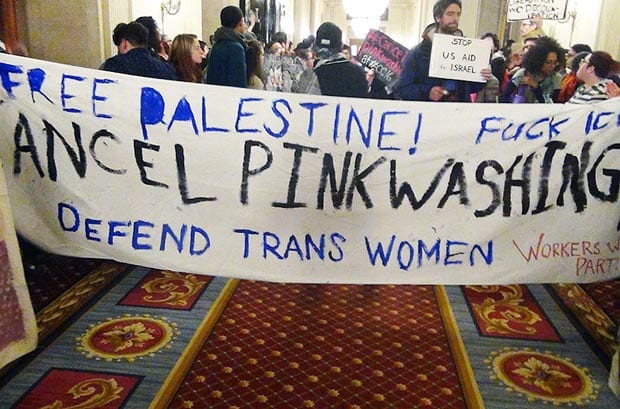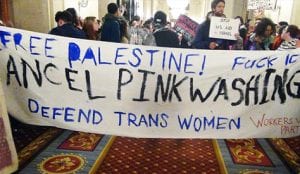Tom Canning is director of development for Jerusalem Open House. He is also the English-speaking media representative for the organization. His English is beautiful, because he spent five years as a child in Houston.
I spoke to him last week while he was still in the U.S. before returning to Israel. He was in this country to attend Creating Change to discuss a murder at Jerusalem Pride last year. He never expected to be the object of protests at the LGBT activists’ conference. Instead of any sort of welcome, the National LGBTQ Task Force canceled a reception planned for him. After counter-protests from Jewish leaders around the country, the reception was reinstated, which was shut down by protesters calling attendees at a Shabbat service “kike” and threatening the destruction of Israel.
Before protesters became openly anti-Semitic, the protests were aimed at the idea of “pinkwashing,” the concept that Israel uses its progressive treatment of the LGBT community as a public relations ploy to cover up its treatment of Palestinians. But Jerusalem House, where LGBT Jews, Palestinians and Israeli Arabs mix, is exactly what protesters, presumably, would like to see throughout the country.
Jerusalem Open House is a 20 year old community center. Unlike its counterpart in Tel Aviv, his organization receives no public funding. The Tel Aviv center is a municipal facility. Although the two cities are just 40 miles apart, Jerusalem is the religious city and Tel Aviv much more secular.
The Jerusalem center has developed a number of programs including HIV and mental health services, programs for youth, seniors, women and trans.
Like Dallas, senior programming is the latest addition to LGBT services. Canning said there were two groups — one for men and one for women. The men’s group is very social and the women’s group is more activist and feminist. Many of the people participating in both groups are from religious communities and were never able to come out of the closet earlier in life.
Jerusalem Open House is a place where all people are welcome, Canning said. While there can be tension between Muslims and Jews in any setting in Israel, in the LGBT community they mix more freely.
“Sometimes issues come up,” he said. “But the center is a safe place for everyone.”
It is a place where two oppressed groups — LGBT Muslims and LGBT Jews — can come together and find common ground. At the community center in Tel Aviv, he said, the two groups mingle more freely. But the different groups mix in Jerusalem too.
Canning couldn’t give a general rule about acceptance of the LGBT community in Israel.
“People born in Tel Aviv? Life might be easier,” he said. “Being born in a religious community can be life-threatening.”
He said the support for the trans community has a long way to go.
“They’re not doing well,” Canning said. “They’re extremely oppressed, but progress is being made.”
Transitioning is covered by Israel’s public healthcare system, but transphobia is rampant among healthcare givers within that system.
Finally, I asked about “the welcome” he received at Creating Change, a conference that provides “safe space” for all sorts of groups within the LGBT community.
“I was very concerned with what was going on,” he said. “We felt very unsafe.”
Israeli guest tells Voice he felt unsafe at Creating Change

















